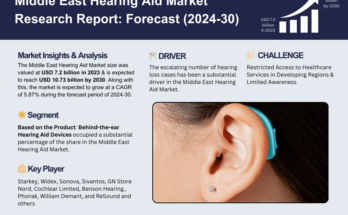In 2021, the market for Over-The-Counter Hearing Aids worldwide was worth $ 1.6 billion US dollars. AMR Group projects that the market will reach US$ 4.8 billion by 2031, growing at a CAGR of 5.4 percent between 2022 and 2031.
Industry Overview
A hearing aid is an electronic device used to improve hearing in people who have hearing loss or auditory nerve damage. Hearing loss is a serious condition that interferes with patients’ daily activities, and if left untreated, the patient may develop other serious conditions such as anxiety, depression, low self-esteem, decreased mobility, dementia, and falls. Hearing aid adoption is projected to increase as the incedences of hearing loss is rising. According to 2020 WHO reports on deafness and hearing loss, approximately 1.1 billion young people (aged 12-35 years) are at risk of hearing loss as a result of noise exposure in recreational settings. Over-the-counter (OTC) hearing aids are a new type of device that consumers can buy without a doctor’s prescription. The devices are designed for adults who have mild to moderate hearing loss. According to the FDARA, over-the-counter hearing aids are designed to assist adults with apparent mild to moderate hearing loss. Consumers should keep in mind, however, that hearing loss can be a symptom of underlying health problems such as diabetes, cardiovascular disease, or chronic kidney disease.
Over-the-Counter Hearing Aids are hearing aids designed for people over the age of 18 who have mild to moderate hearing loss. They are now available without a medical exam, prescription, or fitting adjustment by an audiologist or hearing health professional at stores and online retailers (who are not required to be licensed sellers). However, OTC hearing aids must be user-controllable and customizable to the user’s hearing needs, allowing them to make quantity and frequency-dependent changes based on their personal preferences without the assistance of an expert.
Market Dynamics
The global Over-The-Counter Hearing Aids market is increasing due to the growing incidences of hearing loss among adults globally and introduced of the ‘Establishing Over-the-Counter Hearing Aids’ rule by FDA in order to improve access to effective and safe hearing aids for people with mild to moderate hearing loss by 2022. In addition, the FDA issued guidelines and regulations for device manufacturers. The guidelines are expected to establish a new category of these devices for people suffering like disorders in a convenient and cost-effective way, thus facilitating the demand for Over-The-Counter Hearing Aids. According to the WHO, 466 million people worldwide suffer from disabling hearing loss, accounting for approximately 6.1% of the global population. Furthermore, it is predicted that this figure will rise to around 1.5 billion by 2050, owing primarily to an increase in the elderly population.
The incorporation of advanced devices and the emergence of digital services in the mini device have helped overcome multiple patients’ difficulties and improved their hearing experience as a result of technological advancement. The market is seeing the introduction of digital devices. Smartphone compatibility, Bluetooth connectivity, high sound processing, artificial intelligence (AI), rechargeable batteries, and the most recent tinnitus masking have pushed the hearing device’s capabilities to new heights. Furthermore, difficulty in acceptance form patients that they have a hearing impairment and never undergo a test. Also, due to the social stigma associated with these products, many people hesitate to use them are the factors that is likely to hamper the growth of the Over-The-Counter Hearing Aids which may restrain the market growth.
COVID Impact
The COVID-19 pandemic gave a huge negative impact on the Over-The-Counter Hearing Aids business market. The COVID-19 pandemic became a global health crisis, causing significant disease burden and financial hardship in several sectors of the global economy. Many industries including the healthcare industry have been through a significant transition during the half year of 2020. The pandemic has caused a delay or postponing several medical processes. During the pandemic, the ENT practice disrupted and quarantine led several patients helpless, along with closing of offline stores and non-emergency situation of hearing aid, severely impacted the growth of the market because patients mostly preferred to purchase these devices from the stores.
Regional Trend
Geographically, North America dominated the Over-The-Counter Hearing Aids market and had the largest revenue share of 35.2% in 2021. The growth in this region can be attributed to due to the The availability of favorable government policies and higher incidence of hearing disorders among the population, increases the demand for Over-The-Counter Hearing Aids in this region. According to a National Institute on Deafness and Other Communicable Disorders article, approximately 18% of people aged 20 to 69 have speech frequency hearing loss in one or both ears.
Due to the increasing geriatric population base in countries such as India and Japan, the Asia Pacific region is expected to present outstanding Over-The-Counter Hearing Aids market opportunities as the prevalence of hearing disorders increases with age. Furthermore, government initiatives aimed at raising awareness about the condition are expected to boost regional market growth. Increased parental awareness of the potential long-term effects of ear treatments in patients has increased the emphasis on early diagnosis and treatment.
Competitive Landscape
Key players operating in the Over-The-Counter Hearing Aids Market include Audicus, Bose, Cochlear Ltd, Demant A/S, Eargo Inc., GN Store Nord A/S, Jabra, Lively, MD Hearing, MED-EL, RION Co., Ltd., Sonova, Starkey and WS Audiology among others. Demant A/S held the market revenue leadership position. This company’s presence in the fields of hearing devices and cochlear implants, as well as its expanded geographical presence, are some of the key factors contributing to its dominance. The company announced the launch of new groundbreaking hearing aid technology in four hearing aid brands in November 2020: Oticon, Philips Hearing Solutions, Bernafon, and Sonic.
Key USP’s-
Jabra announced the release of Jabra Enhance Plus online and in stores in 2022. Jabra Enhance Plus in-ear devices improve hearing while also allowing users to answer calls and listen to music.
Market Segmentation
Based upon the Product Type in the Over-The-Counter Hearing Aids market is segmented in In-the-Ear Hearing Aids, Receiver-in-the-Ear Hearing Aids, Behind-the-Ear Hearing Aids and Canal Hearing Aids. The Canal Hearing Aids type dominated the Over-The-Counter Hearing Aids market in 2021. Canal Hearing Aids segment rises due to their feature an invisible design, which fits completely inside the ear canal. The design helps to reduce external noises, which is expected to drive device acceptance. Moreover, growing R&D initiatives undertaken by the prominent stakeholders in order to enhance their performance and growing preference for invisible devices by the young generation are some of the key factors, which are anticipated to increase their recognition. Based on the Technology, the Over-The-Counter Hearing Aids market is segmented into Digital Hearing Aids and Analog Hearing Aids. In the Technology segment the most dominant market is Digital Hearing Aids which acquires the largest Over-The-Counter Hearing Aids market share in 2021. This segment is driven due to the to greater flexibility in hearing aid programming. Furthermore, the microchip in these devices aids in the analysis of speech and other environmental sounds.
Distribution Channels segment of Over-The-Counter Hearing Aids market is further bifurcated into OTC (Over the Counter), Medical Channel/ Hospitals Pharmacies, and Private Practice/ Retail Pharmacies. In 2021, the Medical Channel/Hospital Pharmacies segment accounted for the lion’s share of the global market. Favorable health reimbursement for hearing implant surgeries and rising penetration of hearing implants may boost this segment’s growth, as Well as over Hearing Aids, is high in hospitals due to an increase in the number of patients attending for treatment.
By Product Type
• In-the-Ear Hearing Aids
• Receiver-in-the-Ear Hearing Aids
• Behind-the-Ear Hearing Aids
• Canal Hearing Aids
By Technology
• Digital Hearing Aids
• Analog Hearing Aids
By Distribution Channel
• OTC (Over the Counter)
• Medical Channel/ Hospitals Pharmacies
• Private Practice/ Retail Pharmacies
Global Over-The-Counter Hearing Aids Market: Regional Analysis
All the regional segmentation has been studied based on recent and future trends, and the market is forecasted throughout the prediction period. The countries covered in the regional analysis of the Global Over-The-Counter Hearing Aids market report are U.S., Canada, and Mexico in North America, Germany, France, U.K., Russia, Italy, Spain, Turkey, Netherlands, Switzerland, Belgium, and Rest of Europe in Europe, Singapore, Malaysia, Australia, Thailand, Indonesia, Philippines, China, Japan, India, South Korea, Rest of Asia-Pacific (APAC) in the Asia-Pacific (APAC), Saudi Arabia, U.A.E, South Africa, Egypt, Israel, Rest of Middle East and Africa (MEA) as a part of Middle East and Africa (MEA), and Argentina, Brazil, and Rest of South America as part of South America.
Key Questions Answered in the Report:
- What will be the development pace of market? What is the growth rate of the global market?
- Who are the key manufacturers in the market space? Who are the world’s leading manufacturers?
- What are sales, revenue, and price analysis of the top manufacturers of market?
- Who are the distributors, traders, and dealers of market? What are the key factors driving the Global market?
- What are the market opportunities and threats faced by the vendors in the industries?
- What are deals, incomes, and value examinations by types and applications of the market?
- What are the primary factors driving market?
- What are the market’s advantages, disadvantages, and risks, as well as an overview of the market?
- Who are the Top Manufacturers in the Market in Terms of Sales, Revenue, and Price Analysis?
- Analysis of Industry Revenue, Sales, and Pricing, what is the difference between Equipment by region, type, and application?



